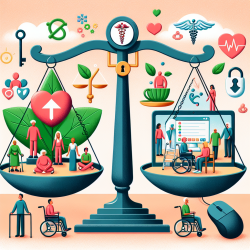Introduction
The COVID-19 pandemic has profoundly impacted the mental health of adolescents, exacerbating existing vulnerabilities and creating new challenges. The study titled "Associations between Adverse Childhood Experiences and Pandemic-Related Stress and the Impact on Adolescent Mental Health during the COVID-19 Pandemic" sheds light on the compounding effects of adverse childhood experiences (ACEs) and pandemic-related stress on adolescent mental health. This blog aims to help practitioners improve their skills by implementing the research outcomes and encouraging further exploration into this critical area.
Key Findings from the Study
The research conducted by Verlenden et al. (2022) utilized longitudinal data from the COVID Experiences (CovEx) Surveys, focusing on U.S. adolescents aged 13-19. The study found significant associations between ACEs, pandemic-related stress, and depressive symptoms. Key findings include:
- Females reported higher ACEs, pandemic-related stress, and depressive symptoms than males.
- The Pandemic-Related Stress Index (PRSI) score at Wave 1 was positively associated with depressive symptoms at Wave 2.
- ACEs at Wave 1 were positively associated with both PRSI at Wave 1 and depressive symptoms at Wave 2.
- Pandemic-related stress had a direct adverse impact on adolescent depressive symptoms, demonstrating a compounding effect with childhood adversity.
Implications for Practitioners
Understanding these findings can significantly enhance the effectiveness of interventions aimed at improving adolescent mental health. Here are some practical steps practitioners can take:
- Screening and Early Intervention: Regular screening for ACEs and pandemic-related stress in adolescents can help identify those at higher risk for depression. Early intervention can prevent the escalation of symptoms.
- Trauma-Informed Care: Implementing trauma-informed approaches in therapeutic settings can help address the compounded effects of ACEs and pandemic stress. This includes understanding the impact of trauma on behavior and tailoring interventions accordingly.
- Gender-Sensitive Interventions: Given the higher reported rates of stress and depressive symptoms among females, gender-sensitive approaches should be integrated into mental health programs.
- Community and School-Based Programs: Schools and communities play a crucial role in providing support. Programs that foster connectedness and resilience can mitigate the negative impacts of stress and trauma.
Encouraging Further Research
While this study provides valuable insights, further research is needed to explore the nuances of how ACEs and pandemic-related stress interact to affect mental health. Practitioners are encouraged to engage in or support research efforts that:
- Examine the long-term effects of pandemic-related stress on different demographic groups.
- Explore the efficacy of various intervention strategies in reducing depressive symptoms among adolescents with high ACEs.
- Investigate the role of social determinants of health in moderating the impact of stress and adversity.
Conclusion
The study by Verlenden et al. highlights the critical need for targeted mental health interventions for adolescents, particularly in the wake of the COVID-19 pandemic. By integrating the findings into practice, practitioners can better support the mental health and well-being of adolescents, paving the way for healthier future generations.
To read the original research paper, please follow this link: Associations between Adverse Childhood Experiences and Pandemic-Related Stress and the Impact on Adolescent Mental Health during the COVID-19 Pandemic.










